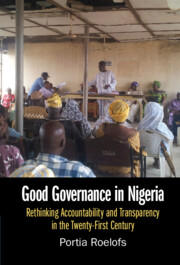Book contents
- Good Governance in Nigeria
- Good Governance in Nigeria
- Copyright page
- Dedication
- Epigraph
- Contents
- Figures
- Tables
- Acknowledgements
- Abbreviations
- Major Characters
- Map of Nigeria
- Additional material
- Introduction
- 1 Contested Legacies of Good Governance
- 2 Good Governance, What’s Not to Love?
- 3 Be Accessible! Accountability, Performance and the Politician Who Is ‘Always in a Meeting’
- 4 Theorising Accountability as Accessibility
- 5 Transparency in People
- 6 Socially Embedded Good Governance
- Conclusion
- Appendix: Methods and Methodology
- Glossary of Yoruba Terms
- Select Bibliography
- Index
1 - Contested Legacies of Good Governance
Published online by Cambridge University Press: 13 April 2023
- Good Governance in Nigeria
- Good Governance in Nigeria
- Copyright page
- Dedication
- Epigraph
- Contents
- Figures
- Tables
- Acknowledgements
- Abbreviations
- Major Characters
- Map of Nigeria
- Additional material
- Introduction
- 1 Contested Legacies of Good Governance
- 2 Good Governance, What’s Not to Love?
- 3 Be Accessible! Accountability, Performance and the Politician Who Is ‘Always in a Meeting’
- 4 Theorising Accountability as Accessibility
- 5 Transparency in People
- 6 Socially Embedded Good Governance
- Conclusion
- Appendix: Methods and Methodology
- Glossary of Yoruba Terms
- Select Bibliography
- Index
Summary
Over the past 200 years, rival political camps in southwest Nigeria have offered competing ideas of good governance. The Yoruba progressive tradition emphasises an epistemic approach to governance, embodied in the Yoruba concept of olaju (civilisation or development) and the figure of Chief Obafemi Awolowo. More populist challengers have long countered this elitist approach with a more socially embedded offering, emphasising closeness and connection between leaders and followers, and material exchange. This second populist tradition has been associated with the more nefarious aspects of Nigerian politics, from the distribution of patronage to the dominance of ‘godfather’ figures. This chapter adds nuance to debates about godfather politics, with analysis of key figures in Oyo state politics. By 2011, a new generation of politicians in the progressive tradition, led by newly elected Governor Abiola Ajimobi, repudiated the amala politics associated with the region’s godfathers and affirmed donor-originated ideas of good governance. In tracing how assorted politicians in Yorubaland have sought to honour the epistemic, social and material elements of governance, this chapter concludes that we should be sceptical of any claim to a monopoly on good governance.
Keywords
- Type
- Chapter
- Information
- Good Governance in NigeriaRethinking Accountability and Transparency in the Twenty-First Century, pp. 58 - 104Publisher: Cambridge University PressPrint publication year: 2023

